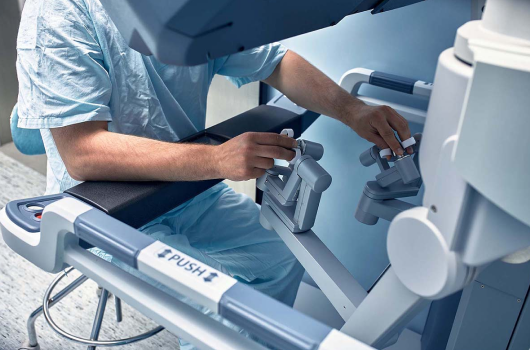How Long is the Recovery Time from Hip Replacement Surgery?

Living with hip pain can take a major toll on your daily life. Whether it’s struggling to walk, missing out on family activities, or dreading staircases, you know it’s time for a change. If you are considering hip replacement surgery, you probably have endless questions. One of the most common is: how long does it take to recover from hip replacement?
The quickest answer to questions about hip replacement recovery time is that it typically takes several months to a year. However, a highly experienced hip replacement surgeon like Dr. Ayaz Biviji can give you a more specific answer to this question. Dr. Biviji can also help reduce your recovery timeline for a hip replacement.
Dr. Biviji is a Board-certified orthopedic surgeon with over 20 years of experience in joint replacement. He has helped patient after patient with joint replacement needs move past their pain and regain their mobility. He is also highly experienced and at the forefront of cutting-edge techniques, including robot-assisted hip replacements.
Below, you can review general information about the different stages of hip replacement care. This article summarizes factors that can reduce or prolong recovery time. But when you need a more in-depth review of how a hip replacement might affect you, Ayaz A. Biviji can give you the best guidance.
Why settle for limping through life? A better, pain-free future is closer than you think. Take the first step toward easier movement and faster recovery—schedule your consultation with Dr. Biviji today!
What Affects Hip Replacement Surgery Recovery Time?
The following factors might influence your recovery timeline for a hip replacement:
- Pre-surgery fitness. Strengthening muscles around your hip before surgery can help accelerate recovery.
- Your age and overall health. Younger, healthier individuals might recover more quickly after surgery.
- Surgical technique. Robot-assisted procedures such as those Dr. Biviji focuses on, may improve precision and reduce recovery time.
- Compliance with aftercare recommendations. Keeping your incisions clean, staying healthy, taking your medications, and using assistive devices such as crutches or walkers for as long as your doctor recommends can help you avoid the types of complications that might delay a full recovery.
- Commitment to physical therapy. Patients who follow their therapy plan tend to recover faster and more fully.
Engaging in healthy habits and finding a skilled surgeon can also delay or prevent your need for revision surgery.
What to Expect from the Recovery Timeline for a Hip Replacement
When considering how long it takes to recover from hip replacement surgery, remember that recovery comes in waves. Below are the multiple stages of the rehabilitation process after hip replacement surgery.
Immediate Post-Surgery Care (Days 1–5)
Many hip replacement patients stay in the hospital for one to five days after surgery. After you undergo a replacement, you will likely receive instructions regarding the following:
- Antibiotics,
- Pain medication,
- Blood thinners, and
- Keeping your dressings clean.
Also, a physical therapist may guide you on how to walk with an assistive device like crutches or a walker. How quickly you can go home after surgery depends on your progress.
Early Recovery (Weeks 2–4)
In this phase, your focus will typically be on healing and rebuilding strength. You will likely continue using assistive devices while gradually increasing your strength and mobility.
Physical therapy after hip replacement begins during this time and can be a crucial step to help you regain range of motion and prevent stiffness. Around the two to four-week mark, you might find that you no longer need prescription medication to manage your post-operative pain. At this point, you might regain your ability to drive, which can be liberating for many.
Intermediate to Final Recovery (Weeks 5–8 and Beyond)
By week six, many hip replacement recipients can engage in all their regular activities except for high-impact activities. After six weeks have passed, you will likely also have a follow-up appointment with your hip surgeon. During your visit, the surgeon will likely review how your replacement is looking in X-rays and how well your healing is going.
For many people, the eight-week mark is the end of the road for post-surgery rehabilitation. However, consistency in complying with your surgeon’s recommendations at every recovery stage is key to ensuring steady and permanent progress.
Recovery Tips for Hip Replacement Surgery
To speed up and maximize your recovery, consult your surgeon and keep the following tips in mind.
Give Your Surgeon All the Details
Sometimes, we might feel embarrassed by unhealthy habits we have or past mistakes we made that affect our physical or mental well-being. But you should feel no shame when discussing any of your physical or mental issues with your surgeon. When you share all the details of your habits and your current or past health status, your surgeon can customize the best surgery and recovery plan for you.
Prepare Your Home
Before surgery, create a recovery-friendly environment. Remove tripping hazards, stock up on essentials, and ensure you have a comfortable place to rest.
Stick to Your Therapy Plan
Physical therapy after a hip replacement is a cornerstone of recovery. Follow your therapist’s guidance to rebuild strength and mobility.
Get Strong and Eat a Balanced Diet
Before and after surgery, you need to focus on your strength and health. A proper exercise regimen and good nutrition support healing and boost energy levels.
Stay Active and Be Careful
Gradually increase your activity levels as recommended, and avoid high-impact movements that might damage the improvements from your surgery. To preserve the integrity of your replacement, you may have to avoid contact sports and high-speed athletic activities that are rough on your joints.
Communicate with Your Team
If you have questions or concerns before or after surgery, do not hesitate to reach out to your surgeon and supporting healthcare providers. Ayaz A. Biviji, MD, and his team are here to give you the best care.


Your active life is waiting.
Dr. Biviji’s innovative approach to hip replacement can help you recover faster and move with ease. Let’s rewrite your recovery story—schedule your consultation now and start living without limits!
Why Choose Dr. Biviji for Your Hip Replacement?
With his extensive training and experience, Dr. Biviji brings advanced skills and a personal touch to every procedure. He has spent over two decades perfecting his approach to joint replacement, earning the trust and gratitude of countless patients. Here’s what you can expect from his care:
- Personalized treatment. Every recommendation is tailored to your unique needs, just as Dr. Biviji would do for his own family.
- Advanced technology. As an early adopter of robotic joint replacement, Dr. Biviji uses state-of-the-art tools to improve precision and minimize recovery time.
- Comprehensive support. Dr. Biviji and his team are always available to address your questions, manage complications, and guide you through every step of your recovery.
Move Freely Again: Personalized Hip Replacement Recovery with Ayaz A. Biviji, MD
Hip replacement surgery is more than just a procedure—it’s the beginning of a new chapter in your life. With a personalized plan, dedicated care, and a strong focus on your recovery, Dr. Biviji can help you regain the mobility and freedom you deserve. Don’t let pain hold you back from the activities you love.
Reach out to Dr. Biviji’s office today to schedule your consultation and take the first step toward a future full of movement, vitality, and the life you’ve been waiting to live.


24 January 2025
The Top Knee Surgeons in the US

24 January 2025
The Top Hip Surgeons in Southern California

2 December 2024
How Long is the Recovery Time from Shoulder Surgery?





